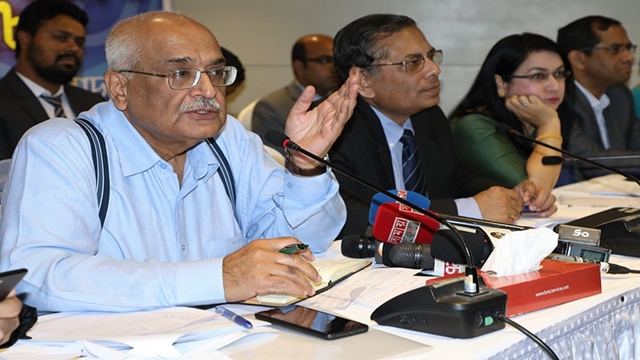SAM
Published:2018-06-04 17:23:13 BdST
CPD opposes ‘ad-hoc’ cut in corporate tax
FT ONLINE
The Centre for Policy Dialogue (CPD) has said that the overall business climate needs to be improved simultaneously with any cut in corporate tax rates.
The CPD, a leading private think-tank, said the corporate tax rates should not be cut in a hasty manner and on an ad-hoc basis, as it fetches about two-thirds of the income tax revenue annually.
It said the reduction of corporate tax proves effective in attracting private investment only when the overall business climate remains conducive.
"Corporate tax reduction does not necessarily ensure investment growth. A business friendly-environment is essential for that," said Dr Mustafizur Rahman.
The distinguished fellow of the CPD was speaking at the presentation of the third instalment of the 'State of the Bangladesh Economy' for the current fiscal year (FY) at a press briefing in Dhaka on Sunday.
He said some reforms are essential to create an environment conducive to growth of business and investment.
"It may not be possible to incorporate reforms in the upcoming budget. But there could be some preparatory work on it', he said.
CPD's comments came at a time when the government is considering a cut in corporate tax rates in response to businesses' persistent demand in this connection.
Finance Minister AMA Muhith has already hinted that he will bring down the corporate tax rate in the upcoming budget.
The CPD said policymakers need to carefully monitor import payments.
The private think-tank also warned the government about unpalatable consequences of an unbridled import growth.
It said a huge amount of money is being laundered through trade transactions.
"The capital flight is happening," CPD's Distinguished Fellow Dr. Debapriya Bhattacharya, who attended the press briefing, said.
"Huge amount of money is being laundered abroad in the name of import ahead of election," the distinguished fellow said.
Dr. Bhattacharya said the there should be proper monitoring to rein in the abnormal growth of imports.
"It could pose a threat to the country's overall economic stability", he said.
Dr Mustafiz presented the keynote paper while its executive director Dr Fahmida Khatoon moderated the event.
The CPD suggested raising the tax-exempted income ceiling to Tk 300,000 from the existing Tk 250,000, taking into cognizance the inflationary pressure.
It also suggested fixing the minimum tax rate at 7.5 per cent replacing the existing rate of 10 per cent. It will help enhance the revenue collection, it said.
It predicted that the total revenue shortfall would stand at Tk 500 billion in FY 2017-2018.
Terming the financial sector the life-blood of the economy, the CPD said the high non-performing loan (NPL) in the banking sector is a matter of concern.
"Our actions to deal with the NPL problem are very much outdated and those need to be amended," Dr. Mustafiz said.
He said money loan court act and bankruptcy act should be immediately amended as those are incapable of combating the current irregular practices in the banking sector.
Dr Mustafiz felt that a 'zero tolerance' policy should be adopted to rein in the NPLs in the banking sector.
On the other hand, Dr. Bhattacharya said he had earlier described the banking sector in Bangladesh as an 'orphan' and the government is oppressing that orphan.
"In sum, it's a perverse political economy prevailing in the country", he said.
He, however, reiterated the demand for constituing a commission on the banking sector so that the next elected government cannot forget the issue of it.
Referring to the stock market situation, Dr Mustafiz said the institutions do not play any role in the market while it experiences volatility. "They should have responsibility," he said.
"The institutions like the ICB, merchant banks and brokerage houses have responsibility during such a type of volatility in the market".
The CPD advised the Bangladesh Securities and Exchange Commission (BSEC) to prepare necessary rules in the greater interest of the capital market.
The CPD said there is a big gap between import costs and wholesale prices of different commodities.
The CPD said consumers are paying at least two and a half times more for sugar than the international prices of the item.
"The consumers also pay as much as one and a half times more for edible oil," it said.
It said many mega projects now being implemented with foreign debts will put pressure on the country's reserve, which would ultimately push up inflation.
"As a result, the bank interest rate will go up putting pressure on the economy", said Dr. Mustafiz.
The CPD said the main challenge of the government in the coming budget will be to hike the tax-GDP (gross domestic product) ratio.
There should be steps for 'outside the court settlement system' to help resolve disputes and release the stuck-funds, said the CPD.
The think-tank also expressed grave concern over the government's growing dependence on borrowing from savings instruments.
The government will have to pay Tk 320 billion as profit to the holders of savings tools in the current fiscal.
It was Tk 150 billion in 2011, it added.
Unauthorized use or reproduction of The Finance Today content for commercial purposes is strictly prohibited.


